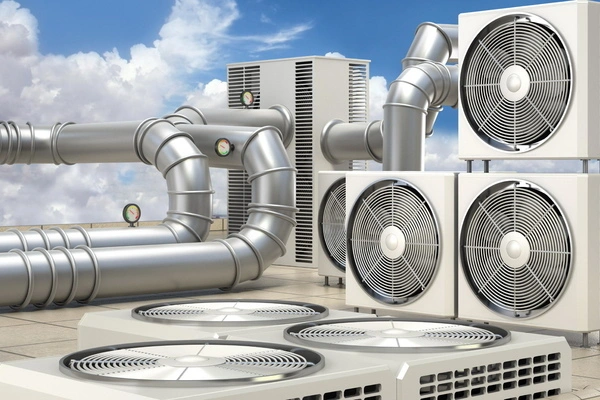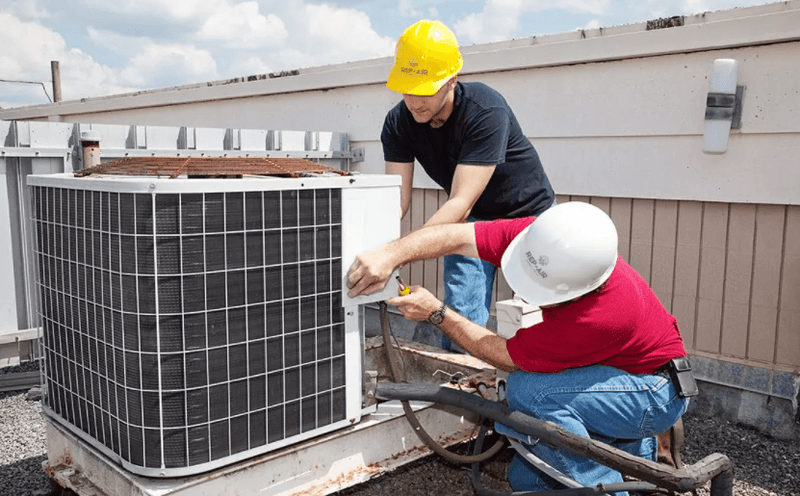Discover why HVAC experts are the best choice for comfort
Exploring the Essential Components of a Reliable Heating And Cooling System
An efficient a/c system is improved several crucial parts that work in harmony. Each component, from the thermostat to the ductwork, plays a vital function in preserving convenience and power performance. Understanding these aspects is crucial for enhancing efficiency and enhancing interior air quality. As one analyzes these parts, the intricate connections in between them reveal understandings right into boosting total system performance. What details factors add most to this performance?
The Role of the Thermostat in Cooling And Heating Performance
Frequently forgotten, the thermostat plays an important duty in the efficiency of Cooling and heating systems. This little tool serves as the primary control facility, controling temperature settings and guaranteeing suitable comfort within a space. By properly noticing the ambient temperature, the thermostat connects with the home heating, air, and ventilation conditioning devices to maintain the wanted environment
A reliable thermostat decreases power consumption by activating the a/c system only when essential, thereby stopping too much heating or cooling. Modern clever and programmable thermostats enhance this effectiveness better by allowing users to set routines and from another location readjust setups, adjusting to day-to-day regimens.
Moreover, the placement of the thermostat is necessary; improper location can lead to unreliable temperature level analyses, causing ineffective procedure. Generally, a well-functioning thermostat not just improves comfort but also adds noticeably to power financial savings and the long life of the HVAC system.
Recognizing the Importance of Air Filters
Air filters offer an important function in heating and cooling systems by ensuring that the air distributing within a space remains tidy and healthy. These filters catch dust, irritants, and various other toxins, preventing them from being recirculated throughout the atmosphere. By capturing these bits, air filters add to improved interior air quality, which can greatly benefit passengers' health and wellness, especially those with allergies or respiratory system conditions.
Additionally, keeping clean air filters boosts the effectiveness of heating and cooling systems. Clogged filters can limit airflow, triggering the system to work tougher to preserve wanted temperatures, leading to raised energy intake and higher energy bills. Consistently changing or cleaning filters is an essential maintenance action that can prolong the life-span of a/c equipment. Inevitably, understanding the value of air filters allows house owners and structure managers to take aggressive procedures to assure a well-functioning, efficient cooling and heating system that promotes a comfy and secure indoor setting.

The Performance of the Heater and Warm Pump
Heaters and heat pumps are essential components of cooling and heating systems, responsible for supplying heat during chillier months. Heaters run by heating air with burning or electric resistance, then dispersing it throughout the home via ducts. They normally offer rapid home heating and can be sustained by all-natural gas, electrical power, or oil, depending upon the system kind.
Conversely, heatpump transfer warm instead than generate it. They extract warm from the outdoors air or ground, also in reduced temperature levels, and move it indoors. HVAC experts. This dual performance enables heatpump to also offer air conditioning in warmer months, making them functional alternatives for year-round climate control
Both systems require appropriate upkeep to assure efficiency and long life. While furnaces master severe cool, heatpump can be helpful in modest environments. Recognizing their distinct performances aids homeowners in choosing one of the most appropriate choice for their home heating needs.
Discovering the Air Conditioning Unit
The a/c system is a crucial element of cooling and heating systems, readily available in numerous types to suit different demands. Recognizing the effectiveness scores of these units is important for making informed choices concerning power consumption and cost. This area will certainly check out the diverse kinds of ac system and clarify how efficiency rankings impact efficiency.
Kinds of Air Conditioners
While different variables influence the selection of air conditioning systems, comprehending the various types available is essential for home owners and structure supervisors alike. Central air conditioners are made to cool whole homes or structures, making use of a network of ducts for air movement. Home window systems provide a more local remedy, perfect for little rooms or single areas. Mobile ac unit give flexibility, permitting customers to relocate the unit as needed. Ductless mini-split systems are another option, combining the effectiveness of central systems with the benefit of zoning, as they need no ductwork. Geothermal systems harness the planet's temperature level for energy-efficient air conditioning. Each kind includes unique benefits, making educated options vital for efficient climate control.

Efficiency Rankings Described
Understanding effectiveness rankings is vital for picking the best cooling unit, as these metrics supply understanding into the system's efficiency and power consumption. One of the most usual rating for air conditioners is the Seasonal Energy why not check here Performance Ratio (SEER), which gauges the cooling output during a regular cooling season separated by the total electric energy input. A greater SEER shows better effectiveness. In addition, the Energy Effectiveness Proportion (EER) is utilized for gauging efficiency under particular problems. Another essential metric is the Power Celebrity certification, which symbolizes that an unit satisfies rigorous power efficiency guidelines. By reviewing these ratings, consumers can make enlightened selections that not only maximize comfort however also lower power expenses and ecological influence.
The Importance of Ductwork and Airflow
Efficient ductwork layout and airflow management play important functions in the overall efficiency and performance of heating and cooling systems. Appropriate ductwork assurances that conditioned air is distributed evenly throughout a space, minimizing temperature changes and improving convenience. Well-designed ducts minimize resistance to airflow, reducing the work on cooling and heating tools and inevitably reducing energy consumption.
Airflow management involves strategically placing vents and registers to enhance the circulation of air. This prevents common issues such as hot or chilly areas, which can happen when airflow is blocked or inadequately balanced. Additionally, the appropriate duct materials and insulation can better enhance efficiency by reducing warmth loss or gain throughout air transit.
A reliable ductwork system not just adds to power financial savings however can also lengthen the life expectancy of a/c equipment by decreasing unneeded stress (HVAC experts). Recognizing the value of ductwork and air movement is important for attaining peak Cooling and heating system efficiency.
Normal Upkeep Practices to Improve Performance
Normal maintenance methods are vital for guaranteeing peak performance of a/c systems. These practices include regular evaluations, cleansing, and necessary repair services to maintain the system running efficiently. Consistently changing air filters is crucial, as clogged filters can obstruct air flow and lower efficiency. Additionally, professionals ought to inspect and tidy evaporator and condenser coils to prevent getting too hot and power wastefulness.
Yearly professional assessments are additionally advised, as qualified service technicians can recognize potential issues before they intensify. Lubricating moving parts decreases wear and tear, contributing to a longer lifespan for the system. Making sure that the thermostat operates appropriately help in maintaining perfect temperature control.
Often Asked Concerns
Exactly how Commonly Should I Replace My Thermostat?
Thermostats ought to normally be changed every 5 to ten years, relying on usage and technology developments. Routine checks are a good idea to assure peak efficiency, particularly if experiencing inconsistent temperature control or enhanced energy costs.
What Size Air Filter Is Best for My HVAC System?
The best size air filter for a HVAC system varies by device layout. Commonly, it's essential to get in touch with the proprietor's guidebook or examine the existing filter measurements to ensure peak performance and air high quality.
Can I Mount a Heat Pump Myself?
Installing a heatpump individually is feasible for competent people, however it requires knowledge of neighborhood codes and electric systems. Employing a professional is suggested to assure proper installment and perfect system efficiency.
How Do I Know if My Ductwork Is Reliable?
To figure out ductwork effectiveness, one need to inspect for leaks, procedure airflow at vents, evaluate insulation high quality, and review temperature distinctions between supply and return air ducts. Expert analyses can supply thorough understandings into total performance.
What Are Indicators My Cooling And Heating Requirements Immediate Upkeep?
Indications that a HVAC system requires instant upkeep include see this uncommon noises, irregular temperatures, boosted energy costs, unpleasant odors, and constant cycling. Resolving these concerns quickly can stop further damages and guarantee height system performance.
Air filters offer a crucial function in Cooling and heating systems by assuring that the air circulating Going Here within a room remains healthy and clean. Furthermore, keeping clean air filters enhances the performance of Heating and cooling systems. Ductless mini-split systems are one more choice, incorporating the effectiveness of central systems with the convenience of zoning, as they need no ductwork. Comprehending performance ratings is necessary for choosing the ideal air conditioning unit, as these metrics supply understanding right into the system's efficiency and energy usage. The best size air filter for a Cooling and heating system differs by system style.